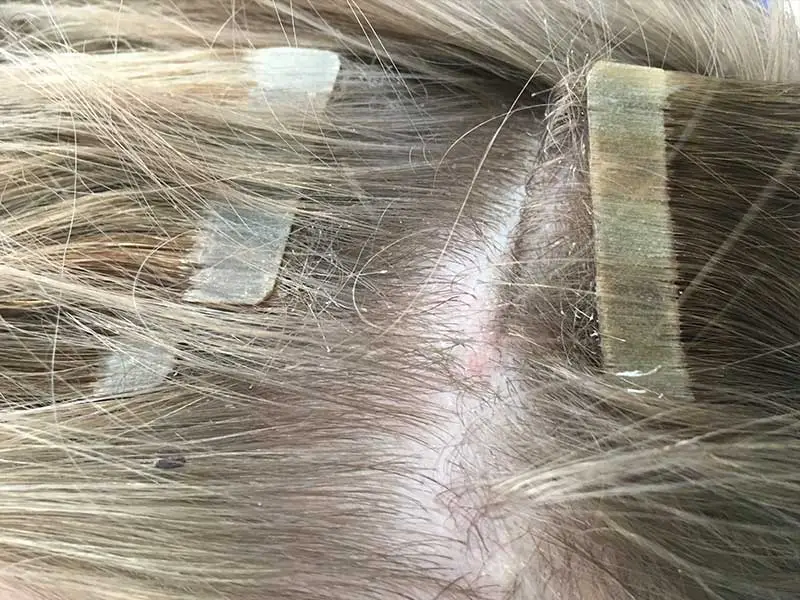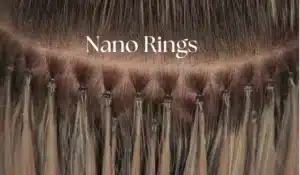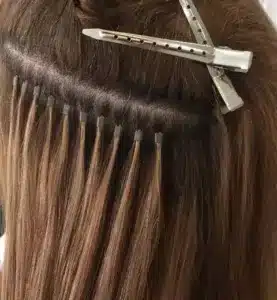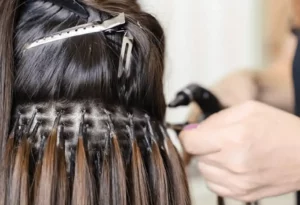You’re probably wondering whether tape-in extensions could be contributing to hair thinning or loss, and as a salon professional, you need solid answers. Let’s clear this up and help you make the right call for your clients.
Tape-in extensions, when applied correctly, shouldn’t cause hair loss. However, improper application, overuse, or poor maintenance can lead to issues like hair thinning or traction alopecia. It’s important to use high-quality tape and ensure proper care.
There’s a bit more to this topic than meets the eye. Let’s dive deeper into what you, as a pro, need to know to ensure your clients’ hair stays healthy and their extensions stay in place without damage.

Understanding Tape-In Extensions and Hair Health
Tape-in extensions have become one of the most popular options in the hair extension world due to their relatively easy application and natural look. But, like any other hair extension method, there are some considerations to keep in mind to ensure your client’s hair stays as healthy as possible.
What Causes Hair Loss with Tape-Ins?
Though tape-in extensions are designed to be less damaging than other methods (like bonding or sew-ins), they can still lead to hair loss if not properly applied. The main culprits? Too much tension, incorrect placement, and improper removal.
- Excessive Tension: When tape-ins are applied too tightly, they can place too much stress on the natural hair. Over time, this can lead to hair thinning or breakage at the root.
- Incorrect Placement: If the extensions are applied too close to the scalp, they can cause strain on the natural hair, leading to hair loss or even permanent damage.
- Improper Removal: Removing tape-ins too quickly or without the right products can pull the natural hair out along with the extensions.

How to Prevent Hair Loss with Tape-In Extensions
Now, here’s the good news: hair loss due to tape-in extensions is completely avoidable with the right approach. Here are a few tips for ensuring the best results:
- Ensure Proper Application: Always apply tape-ins with enough space from the scalp. Avoid adding too much tension, especially around the hairline or other sensitive areas.
- Use High-Quality Products: Low-quality tape or extensions made with non-remy hair can contribute to tangling and breakage, which can lead to hair loss. Always opt for premium quality hair and adhesive.
- Educate Your Clients on Aftercare: Proper aftercare is key. Encourage your clients to avoid excessive brushing, tight hairstyles, or harsh chemical treatments while wearing tape-ins.
- Don’t Overuse: While tape-ins are relatively low-maintenance, keeping them in too long without removal and reapplication can weaken the natural hair. Remind clients to schedule regular touch-ups.
How Tape-Ins Compare to Other Extension Methods
When choosing the best extension method for your clients, it’s worth comparing tape-ins to other popular options, like fusion or sew-in extensions.
| Extension Type | Application Time | Damage Potential | Move Up |
| Tape-Ins | Quick (40-60 minutes) | Low (with proper care) | 6-8 weeks |
| Fusion | Longer (2-4 hours) | High (due to glue) | 3-4 months |
| Sew-Ins | Medium (1-2 hours) | Moderate (depends on tightness) | 6-8 weeks |
When to Avoid Tape-In Extensions
While tape-ins work for most clients, they’re not the best option for everyone. If a client already has weak or thinning hair, tape-ins might exacerbate the problem. It’s crucial to assess the client’s natural hair condition before moving forward with this method.
- Clients with Thinning Hair: If the client has weak or thinning strands, other extension methods like clip-ins or more lightweight wefts might be a better choice.
- Clients with Sensitive Scalps: Those with scalp sensitivity or issues like dandruff may find tape-ins irritating.

Conclusion: Can Tape-In Extensions Cause Hair Loss?
The short answer is yes—if not applied correctly or cared for properly, tape-ins can lead to hair loss. However, with the right technique, high-quality products, and proper aftercare, tape-in extensions can be a safe and effective way to enhance volume and length without compromising hair health.
As a professional, you have the power to ensure your clients get the best possible results. So, educate, apply carefully, and maintain regularly to keep hair looking great—and growing strong!
Hibiscus Hair Manufacturer has been dedicated to producing high-quality tape in hair extensions for 25 years and is a recognized leader in the industry. If you are interested in finding a reliable hair extensions supplier and wholesale for your brand, please visit our website for more information:





